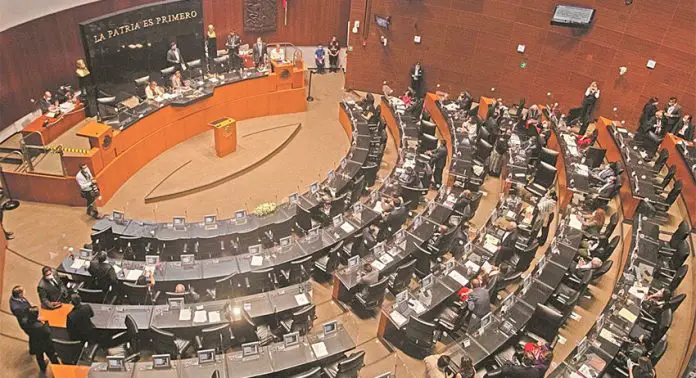The Senate on Thursday approved a constitutional reform that eliminates legal immunity for Mexico’s sitting president.
Eighty-nine senators voted in favor of the reform, which has already been approved by the lower house of Congress, while 23 opposed it.
It must now be ratified by a majority of Mexico’s 32 state legislatures in order to be declared constitutionally valid.
While in office “the president of the republic can be charged and tried for treason, acts of corruption, electoral crimes and all crimes for which any citizen can be tried,” the reform says.
The constitution currently states that the sitting president can only be tried for treason and “serious crimes of the common order,” a protection known in Spanish as the fuero.
The Senate also approved a constitutional reform stipulating that federal lawmakers can be charged with and tried for any crimes they commit while in office. That reform has been sent to the lower house of Congress for revision.
President López Obrador, who has informally accused his recent predecessors of all manner of corrupt and illicit activities, described the approval of the reform that removes the head of state’s protection from prosecution as an “historic act.”
“[I want to] thank the senators because the initiative to remove presidential immunity was approved. It’s an historic act, the sitting president couldn’t be tried … except for treason and that meant immunity,” he said.
“This was established … in the 1857 constitution, it was maintained in [the] 1917 [constitution]. It’s not until now that presidential immunity is removed, we’re talking about 150 years that this privilege was maintained for the president,” López Obrador said.
“In half plus one of the state legislatures, 17, there won’t be any problem [ratifying the reform]. Before the year ends this constitutional reform will come into force.”
Some lawmakers were critical of the reform because prosecution of a sitting president has to be approved by the Senate.
National Action Party Senator Víctor Fuentes labeled the process “fifí,” or elitist, a word the president favors for describing his adversaries. Fuentes said that in reality the president will not be treated as a common citizen because of the requirement for Senate approval.
Juan Zepeda Hernández, a senator with the Citizens Movement party, said that there was no possibility that López Obrador could face justice should he commit a crime because the ruling Morena party has a majority in the upper house.
“His majority in the Senate gives him unanimous support. The issue has a propagandistic purpose,” he said.
Source: El Universal (sp)
